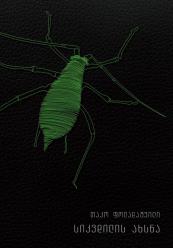Interpreting Death is Tako Poladashvili’s first novel: it gives a clear sense of the author’s writing style, which should be familiar to those who know the short stories of this writer at the start of her career. This time Tako Poladashvili appears as an author of genre literature and offers us a modern dystopia full of magic and mystery, in which every character is simultaneously a criminal and a victim, good and bad. The boundary between the possible and impossible, right and wrong, has been abolished.
Tako Poladashvili’s prose is always distinguished by its magical realism. Every story is simultaneously very naturalistic and unimaginably magical. The author has a habit of taking the plot lines down a blind alley, of tangling them up, putting characters in situations with no exit, and then unexpectedly taking decisions which are absolutely unpredictable for the reader. Consequently, we find in her works elements of the detective story, classical mystery and dynamics typical of modern dystopias.
Interpreting Death tells us about a territory isolated from civilisation, about a population and reservation in which forgotten, rescued and specially marked human beings are forced to live. Each one of them has their own past, their own history and each one thinks about how to escape from this prison of a city. Only one cable-way connects the city to the outer world, cable cars occasionally bring provisions for the forgotten, sometimes various groceries, sometimes – death. Here nobody can be calm, even though nobody shows signs of anxiety. People exist as best they can, they have all forgotten about their existence outside the city. In the novel, death is sometimes a punishment, sometimes a way out, sometimes a means of threatening people, sometimes even a path to freedom. The dystopian environment is all the more acutely felt when nature and cold air add to the sense of being locked in the city. The novel gives an acute sense of atmosphere and of a cold, both in the air and between people, that freezes the blood. Interpreting Death is not a novel about death, it is more a story of the monotony of death, about the way that many things exist.
In this world, what is harder than death is what overcomes the cruelty of death. In the novel the plot develops in constant tension and what is called ‘suspense’. Crime is constantly there, and it is followed by punishment, while the most peaceful and calm periods lead to greater miseries.
‘Interpreting Death can be classified as an anti-Utopia and in many of its characteristics it resembles such work, although it doesn’t fit the classical framework of the genre. The novel shows the writer’s potential and it is clear that the author is in no way trying to follow the easy path. ‘We can see the spiritual energy put into the process of writing, and that is why we must think that we now have another author in contemporary Georgian prose who has extraordinary vision and an already rather high professional mastery.’
Shota Iatashvili, poet, critic
‘For me the main plus in this novel is the atmosphere which the author creates. It is so powerful that at the first reading I kept interrupting my reading, came back to life for a while before continuing, because the atmosphere created was rather oppressive. I have known the author for some time and I would note that both of us lived in an outer suburb of Tbilisi, and the outer suburbs, true, didn’t exactly bring war upon themselves, but were transformed into just such an anti-Utopian space. As a consequence of the spectre of war, they became closed spaces, from which children were not allowed into the centre by their parents, in case there was a war. The same enclosed space is in this book, only it is an isolated city connected by a cable-way to the rest of the world, and I really do remember that my district was just like that, one tram and one bus (three times a week) were the only links with the outer world.’
Alexander Lortkipanidze, poet, critic
Extract will be available soon
In case of using the information, please, indicate the source. 